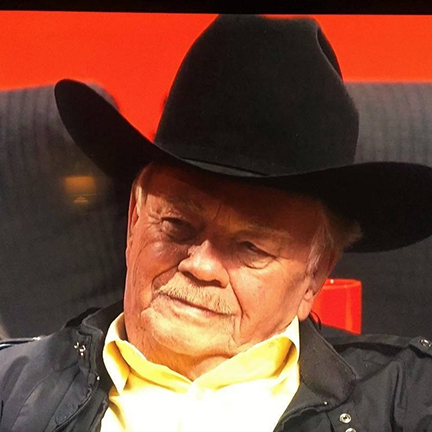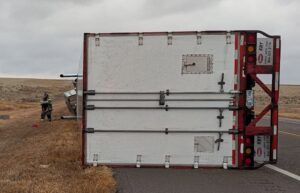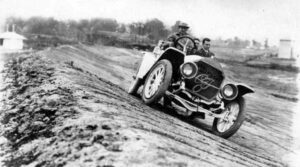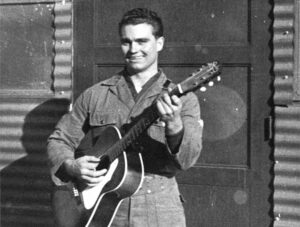Bill Mack’s connection with truck drivers came naturally. Not only was Mack’s father a truck driver, but Mack was born in Shamrock, Texas, in 1932, during the depths of the Great Depression. Shamrock was one of many towns that flourished during the heyday of Route 66. Thousands of “Arkies,” “Okies” and other Americans flocked to California via the famed highway during the Depression, and early versions of semitrucks traveled westward through downtown Shamrock. Mack made a 60-year career of his relationship with truck drivers who listened to the radio during the overnight hours that coincided with Mack’s preferred time slot.
Mack died July 31 from complications associated with COVID-19. He was 88 years old.

Bill Mack, whose surname was actually “Smith,” was a musician first and a radio announcer second. Growing up in Shamrock, he learned to play guitar and harmonica. He formed a band that had a stranglehold on playing at dances in town, particularly at Shamrock High School. When he moved to Canyon, Texas, where he attended West Texas State College, he worked for the campus radio station. A year later, just 19 years old, Mack became news director at KLYN in Amarillo. But he didn’t care much for news radio.
In interviews later in his life, Mack admitted to pulling on-air pranks that were largely intended to make the station’s managers fire him. When he wrote phony stories for an announcer, he knew would read the news “cold” without proofing in advance, he quickly found himself unemployed. But that didn’t matter to Bill Mack. It was all part of his plan.
By 1951, Mack was a songwriter, musician, cartoonist, author and DJ. His first break came when he signed on to host “The Big Six Jamboree” on KWFT-TV in Wichita Falls in the early 1950s. Mack’s work with KWFT landed him a recording contract with Imperial Records.
As a recording artist, Mack turned out 30 songs, none of them particularly successful. However, his varied talents kept him popular in the music business throughout his life.
Through the late ’50s and ’60s, Mack continued recording, switching labels frequently but never finding success. Up until 1970, his one true hit was a song he wrote but did not record — “Drinking Champagne.” Cal Smith recorded the first version of the song, which reached the Top 40 in 1968, while George Strait took his cover of the song to No. 4 in 1990.
While Mack might have received his first break in Wichita Falls, his “big” break came in 1969 with WBAP-AM in Fort Worth. The 50,000-watt clear channel station could be picked up on airwaves nationwide during the overnight hours, during Mack’s favorite shift from midnight to 6:00 am. His all-night show, “Open Road,” attracted a huge following, especially among truck drivers.
Soon, Bill Mack became known as “The Midnight Cowboy,” continuing in WBAP’s overnight slot. He received on-air calls from truck drivers around the country. Mack also listened to the CB radio, and on occasion, drivers would stop in at the station and Mack would interview them live on the air. The only time Mack ever thought that having drivers show up at the station would land him in trouble was when a driver with a tall load took out the WBAP sign outside the station.
While WBAP made Mack a nationwide star and essentially served as a satellite station, he also hosted the syndicated radio show “Country Crossroads,” heard on more than 200 stations. He later made the switch to real satellite radio, remaining on Sirius XM until his retirement in 2012.
Between his move from syndication to satellite radio, Mack left his major mark on country music when Lee Ann Rimes, a 13-year old singer with a voice along the lines of Tanya Tucker, recorded “Blue,” a song written by Mack nearly 30 years before Rimes was born. Mack claimed the song had been intended for Patsy Cline, but she died before recording it. Regardless, Rimes took the tune to No. 1, a capstone in Mack’s career.
While Mack spent the last eight years of his life off the air, no doubt many truck drivers who listened to him regularly early in their careers are still on the road today, and to the generation before those drivers, Mack was an icon. Thanks to YouTube and similar streaming websites, his barrel-like radio voice will live on.
Route 66 turned into Interstate 40 many years ago, and Shamrock, Texas, is today nothing more than an interesting exit between the Oklahoma state line and Amarillo, Texas. But chalk another one up to old Route 66. The highway west undoubtedly led country music’s most famous DJ into a career riding alongside and entertaining truck drivers — wherever they might travel.
Since retiring from a career as an outdoor recreation professional from the State of Arkansas, Kris Rutherford has worked as a freelance writer and, with his wife, owns and publishes a small Northeast Texas newspaper, The Roxton Progress. Kris has worked as a ghostwriter and editor and has authored seven books of his own. He became interested in the trucking industry as a child in the 1970s when his family traveled the interstates twice a year between their home in Maine and their native Texas. He has been a classic country music enthusiast since the age of nine when he developed a special interest in trucking songs.









Since retiring from a career as an outdoor recreation professional from the State of Arkansas, Kris Rutherford has worked as a freelance writer and, with his wife, owns and publishes a small Northeast Texas newspaper, The Roxton Progress. Kris has worked as a ghostwriter and editor and has authored seven books of his own. He became interested in the trucking industry as a child in the 1970s when his family traveled the interstates twice a year between their home in Maine and their native Texas. He has been a classic country music enthusiast since the age of nine when he developed a special interest in trucking songs.
I was a over the road Trucker for several years and the Midnight Cowboy AKA Bill Mack was always on in my truck WBAP Fort Worth Texas RIP Bill Mack
First met him on the radio when I was about 9 years old riding with my dad, he carried me through many miles on that old a m radio station.
I miss him and always will!
First met him on the radio when I was about 9 years old riding with my dad, he carried me through many miles on that old a m radio station.
I miss him and always will!